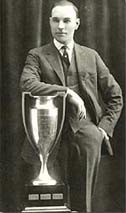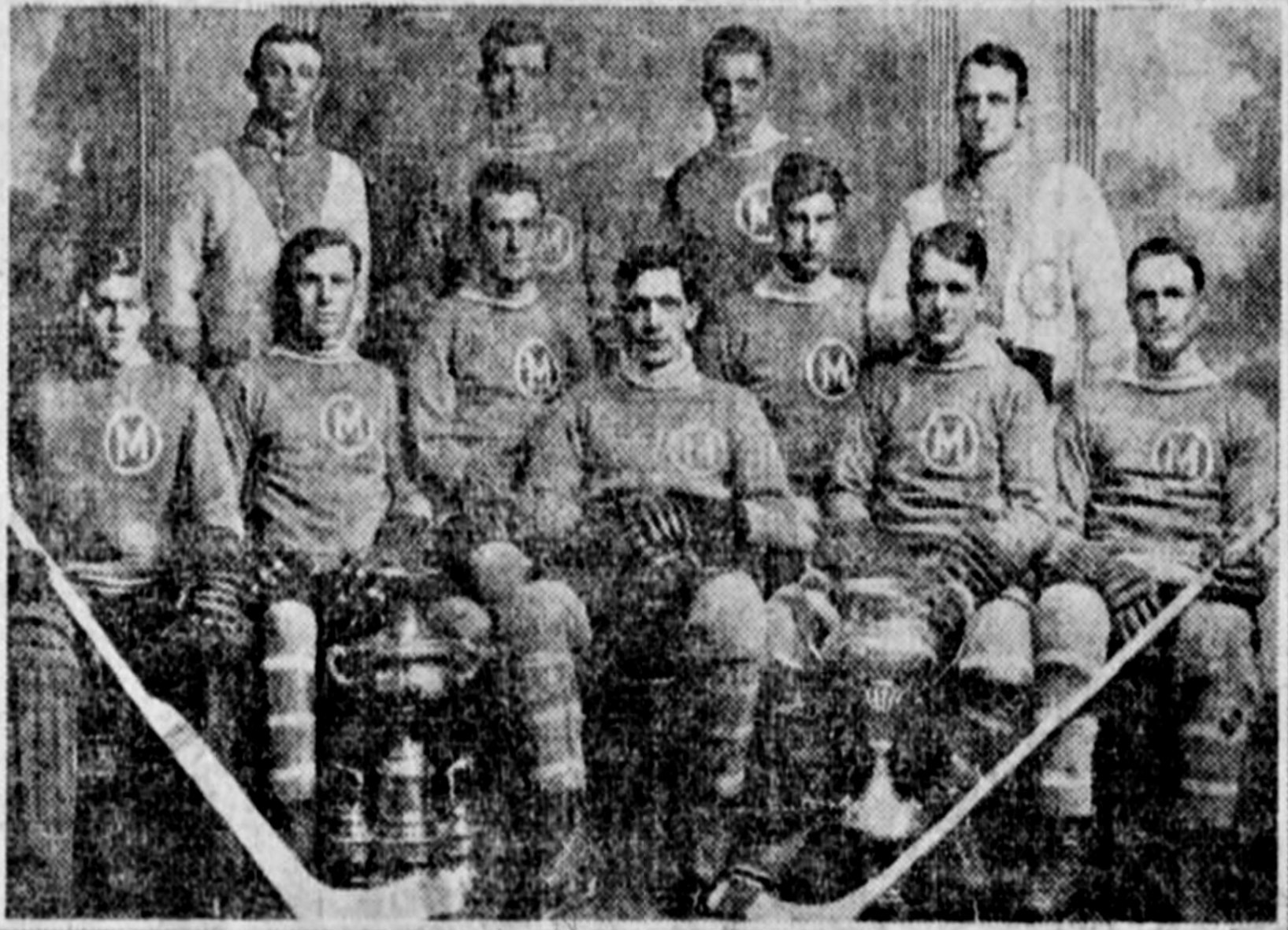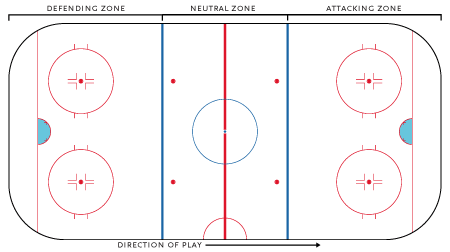 |
Elmer Lach
Elmer James Lach (, January 22, 1918 – April 4, 2015) was a Canadian professional ice hockey player who played 14 seasons for the Montreal Canadiens in the National Hockey League (NHL). A centre, he was a member of the Punch line, along with Maurice Richard and Toe Blake. Lach led the NHL in scoring twice, and was awarded the Hart Trophy in 1945 as the league's most valuable player. He won three Stanley Cups with Montreal. When Lach retired in 1954, he was the league's all-time leading scorer and was inducted into the Hockey Hall of Fame twelve years later. His number 16 was retired on December 4, 2009, during the Montreal Canadiens centennial celebrations. In 2017 Lach was named one of the ' 100 Greatest NHL Players' in history. Early life Lach was born in Nokomis, Saskatchewan, a small town north of Regina. Elmer was the youngest of two boys and four girls born to William and Mary-Ann Lach, who arrived in Canada from Eastern Europe in 1910. Lach's father was at first ... [...More Info...] [...Related Items...] OR: [Wikipedia] [Google] [Baidu] |
 |
Hart Memorial Trophy
The Hart Memorial Trophy, originally known as the Hart Trophy, is an annual award for the most valuable player in the National Hockey League (NHL), voted by the members of the Professional Hockey Writers' Association. The original trophy was donated to the league in 1923 by David Hart, the father of Cecil Hart, the longtime head coach of the Montreal Canadiens. The Hart Trophy has been awarded 98 times to 61 different players since its beginnings in 1923–24. History The Hart Memorial Trophy is named in honour of Canadian Dr. David Hart. Dr. Hart, who donated the original trophy to the NHL, was the father of Cecil Hart, a former Coach and General Manager of the Montreal Canadiens. The trophy was first awarded at the conclusion of the 1923–24 NHL season to Frank Nighbor of the original Ottawa Senators. The original ''Hart Trophy'' was retired to the Hockey Hall of Fame in 1960, and the NHL began presenting a new trophy, which was dubbed the ''Hart Memorial Trophy'' in its p ... [...More Info...] [...Related Items...] OR: [Wikipedia] [Google] [Baidu] |
|
Doug Bentley
Douglas Wagner Bentley (September 3, 1916 – November 24, 1972) was a Canadian ice hockey left winger who played 13 seasons in the National Hockey League (NHL) for the Chicago Black Hawks and New York Rangers as part of a senior and professional career that spanned nearly three decades. He was named to four NHL All-Star teams in his career and was the scoring leader in points and goals in 1942–43 and again in goals in 1943–44. Bentley was one of six hockey playing brothers and at one point played with four of his brothers with the Drumheller Miners of the Alberta Senior Hockey League. He made NHL history when he played on the league's first all-brother line with Max and Reg in 1943. Injuries forced him out of the NHL in 1951, but he returned in 1953–54 to play one last season for the Rangers with Max. He spent several seasons as a player-coach for the Saskatoon Quakers, leading the team to the Pacific Coast Hockey League championship in 1952. Bentley was inducte ... [...More Info...] [...Related Items...] OR: [Wikipedia] [Google] [Baidu] |
|
|
50 Goals In 50 Games
In the National Hockey League (NHL), the phrase "50 goals in 50 games" (50-in-50) refers to a player scoring 50 goals within the first 50 (or fewer) games of his team's season. An extremely rare feat, the NHL has only officially deemed five players in eight different seasons to have reached the mark; Brett Hull is the most recent occurrence, having done so in 1990–91. Wayne Gretzky (three times) and Hull (twice) are the only players with multiple official 50-in-50 accomplishments. Official 50-in-50 scorers Maurice Richard *: 50 in 50 games (50-in-50) Maurice Richard of the Montreal Canadiens was the first player in NHL history to score 50 goals in one season. He scored his 50th goal on March 18, 1945, in the 50th (and final) game of the 1944–45 NHL season on goalie Harvey Bennett of the Boston Bruins. Richard's accomplishment also broke the NHL single-season goal-scoring record; it had previously been held by Joe Malone of the Montreal Canadiens, who scored 44 goals in a ... [...More Info...] [...Related Items...] OR: [Wikipedia] [Google] [Baidu] |
|
|
1944–45 NHL Season
The 1944–45 NHL season was the 28th season of the National Hockey League. Six teams each played 50 games. The Toronto Maple Leafs won the Stanley Cup in seven games versus the Detroit Red Wings. League business In October 1944, Lester Patrick sponsored W. G. Hardy to become NHL president, replacing Red Dutton who wanted to step down. Patrick credited Hardy for being largely responsible for the current professional-amateur agreement between the NHL and the amateur associations in the International Ice Hockey Association, and said he was "temperamentally suited and has an excellent record as an executive of the Canadian Amateur Hockey Association". Dutton offered to resign because of business concerns, but the league's board of governors dissuaded him. Conn Smythe, at one point, was offered the presidency, but turned it down. Dutton then stayed on. Regular season It was the year of the "Punch Line" as Rocket Richard scored 50 goals in 50 games, breaking Joe Malone's record of ... [...More Info...] [...Related Items...] OR: [Wikipedia] [Google] [Baidu] |
|
|
1944 Stanley Cup Finals
The 1944 Stanley Cup Finals was a best-of-seven series between the Chicago Black Hawks and the Montreal Canadiens. The Canadiens won the series 4–0 to win their first Stanley Cup since they defeated Chicago in . Paths to the Finals Chicago defeated the defending champion Detroit Red Wings in a best-of-seven 4–1 to advance to the Finals. Montreal defeated the Toronto Maple Leafs in a best-of-seven 4–1 to advance to the Finals. Game summaries Maurice "Rocket" Richard made his Stanley Cup debut with a five-goal performance in the series, including a hat trick in game two. The Punch Line of Richard, Elmer Lach and Toe Blake scored ten of the Canadiens' 16 goals. Blake scored the Cup winner in overtime. In the same overtime, Bill Durnan stopped the first penalty shot awarded in the Finals, awarded to Virgil Johnson. Stanley Cup engraving The 1944 Stanley Cup was presented to Canadiens captain Toe Blake by NHL President Red Dutton following the Canadiens 5–4 overtim ... [...More Info...] [...Related Items...] OR: [Wikipedia] [Google] [Baidu] |
|
 |
Chicago Blackhawks
The Chicago Blackhawks (spelled Black Hawks until 1986, and known colloquially as the Hawks) are a professional ice hockey team based in Chicago. The Blackhawks compete in the National Hockey League (NHL) as a member of the Central Division in the Western Conference and have won six Stanley Cup championships since their founding in 1926. They are one of the " Original Six" NHL teams, along with the Detroit Red Wings, Montreal Canadiens, Toronto Maple Leafs, Boston Bruins, and New York Rangers. Since , the team has played their home games at the United Center, which they share with the National Basketball Association's Chicago Bulls; both teams previously played at the now-demolished Chicago Stadium. The Blackhawks' original owner was Frederic McLaughlin, a "hands-on" owner who fired many coaches during his ownership and led the team to win two Stanley Cup titles in 1934 and 1938, respectively. After McLaughlin's death in 1944, the team came under the ownership of the ... [...More Info...] [...Related Items...] OR: [Wikipedia] [Google] [Baidu] |
 |
Dick Irvin
James Dickinson "Dick" Irvin Jr. (or II) (July 19, 1892 – May 16, 1957) was a Canadian professional ice hockey player and coach. He played for professional teams in the Pacific Coast Hockey Association, the Western Canada Hockey League, and the National Hockey League (NHL) from 1916 to 1928, when he had to retire from repeated injuries. Irvin was one of the greatest players of his day, balancing a torrid slap shot and tough style with gentlemanly play. For his playing career, Irvin was named to the Hockey Hall of Fame in 1958. After playing, Irvin built a successful career as a coach in the NHL with the Chicago Black Hawks, Toronto Maple Leafs, and Montreal Canadiens. He won one Stanley Cup as a coach with Toronto, three more with Montreal, finishing with over 600 wins as a coach. He also served in the Canadian Expeditionary Force during the First World War. Early life Irvin was born in Hamilton, Ontario, one of 10 children, six boys and four girls. Two of the boys died in infa ... [...More Info...] [...Related Items...] OR: [Wikipedia] [Google] [Baidu] |
 |
1943–44 NHL Season
The 1943–44 NHL season was the 27th season of the National Hockey League. Six teams played 50 games each. The Montreal Canadiens were the top team of the regular season and followed it up with the team's fifth Stanley Cup championship. League business In memory of Frank Calder, the former NHL President who died in 1943, the league's Board of Governors donated the Calder Memorial Trophy to be awarded to the NHL's top rookie. Due to World War II, 75 per cent of the amateurs signed by the NHL ended up in the armed services. In April 1943, Canadian Amateur Hockey Association past-president George Dudley recommended that payments from the NHL for signing amateurs be deferred until players lost due to the wartime enlistments return to professional hockey. The NHL negotiated with W. G. Hardy and the International Ice Hockey Association to sign more junior-aged players than usual, due to World War II travel restrictions. The Canadian Press reported that Hardy was rumored to be appo ... [...More Info...] [...Related Items...] OR: [Wikipedia] [Google] [Baidu] |
|
1940–41 NHL Season
The 1940–41 NHL season was the 24th season of the National Hockey League (NHL). Seven teams each played 48 games. The Boston Bruins were the Stanley Cup winners as they swept the Detroit Red Wings four games to none in the final series. League business In September 1940, International Ice Hockey Association president W. G. Hardy announced a new one-year agreement was reached with the NHL, who agreed to pay $250 for signing an amateur and another $250 if the amateur played in the NHL. NHL president Frank Calder signed the new professional-amateur agreement in October 1940. The agreement also included allowing the NHL to sign a limited number of junior age players. Regular season The Montreal Canadiens had hit the bottom in 1939–40, and were in financial trouble. Frank Patrick decided to become an investor and governor for the team, and Tommy Gorman was hired as general manager. He hired recently released Toronto coach Dick Irvin to run the team. One of the first things G ... [...More Info...] [...Related Items...] OR: [Wikipedia] [Google] [Baidu] |
|
|
Paul Haynes (ice Hockey)
Paul Haynes may refer to: * Paul Haynes (ice hockey) (1910–1989), Canadian ice hockey forward * Paul Haynes (American football) (born 1969), American football coach * Paul Haynes (basketball) (born 1982), American basketball player * E. Paul Haynes Emerson Paul Haynes (March 10, 1918 - May 30, 1988) was second bishop of the Episcopal Diocese of Southwest Florida, serving from 1975 to 1988. Early life and education Haynes was born on March 10, 1918, in Marshfield, Indiana, the son of the Rev ... (1918–1988), bishop of the Episcopal Diocese of Southwest Florida See also * Paul Haines (other) {{hndis, Haynes, Paul ... [...More Info...] [...Related Items...] OR: [Wikipedia] [Google] [Baidu] |
|
 |
Hockey
Hockey is a term used to denote a family of various types of both summer and winter team sports which originated on either an outdoor field, sheet of ice, or dry floor such as in a gymnasium. While these sports vary in specific rules, numbers of players, apparel and, notably, playing surface, they share broad characteristics of two teams playing against each other to propel a ball or disk into a goal with a stick. There are many types of hockey. Some games make the use of skates, either wheeled, or bladed while others do not. In order to help make the distinction between these various games, the word "hockey" is often preceded by another word i.e. "field hockey", "ice hockey", " roller hockey", " rink hockey", or "floor hockey". In each of these sports, two teams play against each other by trying to manoeuvre the object of play, either a type of ball or a disk (such as a puck), into the opponent's goal using a hockey stick. Two notable exceptions use a straight stick and an ... [...More Info...] [...Related Items...] OR: [Wikipedia] [Google] [Baidu] |
|
Punch Line
A punch line (a. k. a. punch-line or punchline) concludes a joke; it is intended to make people laugh. It is the third and final part of the typical joke structure. It follows the introductory framing of the joke and the narrative which sets up for the punch line. In a broader sense, "punch line" can also refer to the unexpected and funny conclusion of any performance, situation or story. Etymology The origin of the term is unknown. Even though the comedic formula using the classic "set-up, premise, punch line" format was well-established in Vaudeville by the beginning of the 20th century, the actual term "punch line" is first documented in the 1920s; the Merriam-Webster dictionary pegs the first use in 1921. Linguistic analysis A linguistic interpretation of the mechanics of the punch line response is posited by Victor Raskin in his script-based semantic theory of humor. Humor is evoked when a trigger, contained in the punch line, causes the audience to abruptly shift it ... [...More Info...] [...Related Items...] OR: [Wikipedia] [Google] [Baidu] |